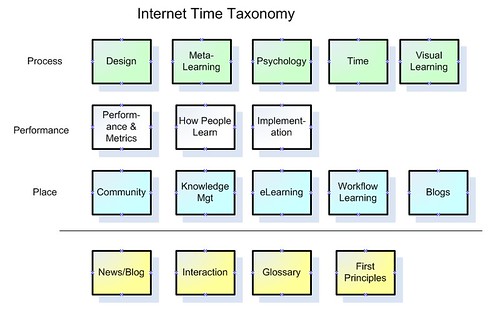Sunday, December 26, 2004
Summary: Learner-centric no more. My focus is shifting to the performance of connections.
 I post to Internet Time Blog almost daily, and I hope my words retain more value than yesterday's newspaper. After all, the Blog is where I share my discoveries and interpretations, not perishable news. Nonetheless, on a standard Blog, the new pushes the old off the bottom of the page, out of sight, and out of mind, regardless of value.
I post to Internet Time Blog almost daily, and I hope my words retain more value than yesterday's newspaper. After all, the Blog is where I share my discoveries and interpretations, not perishable news. Nonetheless, on a standard Blog, the new pushes the old off the bottom of the page, out of sight, and out of mind, regardless of value.
 To keep longer-lived items from falling over the edge, I decided to catch some of the run-off in a KnowledgeBase.
To keep longer-lived items from falling over the edge, I decided to catch some of the run-off in a KnowledgeBase.
I needed a logical structure for pigeonholding incoming items. Performance is what it's all about; that deals with organizational objectives and metrics, the impact of learning, and how performance improvement is implemented. There's a Process level above this that includes meta-learning, design principles, timing, and how humans tick: things that transcend individual cases. There's also a level below that specifies the Place the learning or performance is happening. My first approximation looked like this:

This evening I started divvying things up among the topics. The "Community" topic turned out to cover many potential topics:
Other "co-" words crop up in learning. Constructivism describes learning built on an existing foundation. Connectivism, recently coined by George Siemens, makes it explicit that the learner is augmented with connections to networks of people and information. Context is king this year, dethrowning content. Computer and commerce share the same linguistic heritage, as do commerce, competition, consult, contend, and correct.
So what's the, ahem, connection? A very handy reference tool, The Online Etymology Dictionary, taught me that co- and com- derive from Latin cum, meaning "together, together with, in combination." The co's are all "with" words. It takes more than one to confer, to communicate, to concur, to confer, to condemn or to conceal.
Separate entities...

...collide, connect, converge...

...to create something new.

In the virtual world, virtual connections will do the trick. We can connect with others, with ideas, and with tools from anywhere.
The proliferation of open connections heralds a new world of continuous improvement where chain reactions of combined thoughts and learning recombine in ever-greater patterns.

"Learner-centric" has been the rallying cry of eLearning for five years now. For me, it's time to move on. That particularly squeaky wheel has been oiled enough. We've demolished the "instructor-centric" conceit that the only good learning is that which takes place when there's a real live teacher running the show. Last year, in an informal history of eLearning, I wrote:
 Learning for learning's sake doesn't interest me. I'm pragmatic. This past year, I began to shift my emphasis from the learner to the worker. In 2005, I plan to focus less on individuals and more on ecosystems. My interest is turning to improving the performance of connections between workers and the work environment.
Learning for learning's sake doesn't interest me. I'm pragmatic. This past year, I began to shift my emphasis from the learner to the worker. In 2005, I plan to focus less on individuals and more on ecosystems. My interest is turning to improving the performance of connections between workers and the work environment.
 For me, it's the year of the network connections. What's flowing back and forth to the nodes has my attention. What? Where? When? How? How much? How often? Quality? Impact?
For me, it's the year of the network connections. What's flowing back and forth to the nodes has my attention. What? Where? When? How? How much? How often? Quality? Impact?
Now I've got to re-think that taxonomy. You can never do just one thing.
Selected words derived from Latin cum, "with" or "together"
collaborate = work with
coherent = stick together
college = group of colleagues
colleague = those chosen to work with
collide = strike together
collusion = play together
combat = fight with
combine = yoke together
commence = initiate together
commensurate = measured with
comment = stay mindful with
commerce = trade with
commit = bring together
common = shared with
communicate = impart, share with
companion = one you share bread with
comparison = make equal with
compel = drive together
compendium = weighed together
compensate = weigh together
compete = strive together
complain = beat the breast together
complex = woven with
complication = fold together
compose = put together, arrange
comprehend = grasp with the mind
compute = reckon with, prune
concatenate = link with
conceal = hide with
concentrate = center with
concierge = with slave
concise = cut off with
concoct = boil together
concord = agree with
concourse = run with
concubine = lie with
concur = run together
condemn = damage with
condense = make thick with
condescend = descend with
condolence = suffer with
condominium = own together with
condone = give with
conduct = lead with
confess = admit with
confine = end with
confirm = strengthen with
confiscate = with public treasury
conflate = blow together
conflict = strike together
conform = form together
congeal = freeze with
congress = meeting with
conjugal = with spouse
connect = fashion with
connive = wink together
connoisseur = recognize with
connubial = marriage with
conscious = knowing with
consent = feel together
consequence = follow with
console = comfort with
consolidation = make solid together
conspire = breathe with
constant = stand with
constipate = press together
construct = pile up together
consult = gather together, seize together
consume = take or buy together
contain = hold together
contemporary = with time
contempt = with scorn
contend = stretch with
context = join together
contort = twist with
contribution = pay together
contrive = sing together
convalesce = grow strong with
convene = come together
converge = bend together
converse = move with
convince = conquer
convivial = carouse together
convocation = call together
convoy = go together
copulate = join together, link together
cordial = with heart
correct = with rule
correspondence = answer with
This is inexact science. Time changes meaning. Compete originally meant striving together. Now it has become strive against. It has grown closer to combat (fight with) than collusion (play with).
Related reference: Autopoiesis and Coevolution
 I post to Internet Time Blog almost daily, and I hope my words retain more value than yesterday's newspaper. After all, the Blog is where I share my discoveries and interpretations, not perishable news. Nonetheless, on a standard Blog, the new pushes the old off the bottom of the page, out of sight, and out of mind, regardless of value.
I post to Internet Time Blog almost daily, and I hope my words retain more value than yesterday's newspaper. After all, the Blog is where I share my discoveries and interpretations, not perishable news. Nonetheless, on a standard Blog, the new pushes the old off the bottom of the page, out of sight, and out of mind, regardless of value.
 To keep longer-lived items from falling over the edge, I decided to catch some of the run-off in a KnowledgeBase.
To keep longer-lived items from falling over the edge, I decided to catch some of the run-off in a KnowledgeBase.
I needed a logical structure for pigeonholding incoming items. Performance is what it's all about; that deals with organizational objectives and metrics, the impact of learning, and how performance improvement is implemented. There's a Process level above this that includes meta-learning, design principles, timing, and how humans tick: things that transcend individual cases. There's also a level below that specifies the Place the learning or performance is happening. My first approximation looked like this:

This evening I started divvying things up among the topics. The "Community" topic turned out to cover many potential topics:
- collaboration
- learning with peers
- social software apps
- discussion groups and wikis
- Communities of Practice
- informal learning
- reputation management
- expert locators
- corporate culture
- groupware
- social network analysis
Other "co-" words crop up in learning. Constructivism describes learning built on an existing foundation. Connectivism, recently coined by George Siemens, makes it explicit that the learner is augmented with connections to networks of people and information. Context is king this year, dethrowning content. Computer and commerce share the same linguistic heritage, as do commerce, competition, consult, contend, and correct.
So what's the, ahem, connection? A very handy reference tool, The Online Etymology Dictionary, taught me that co- and com- derive from Latin cum, meaning "together, together with, in combination." The co's are all "with" words. It takes more than one to confer, to communicate, to concur, to confer, to condemn or to conceal.
- Com-puter = reckon with
Con-spire = breathe with
Con-tend = stretch with
Con-trive = sing with
Con-tribute = pay together
Con-verge = bend together
Com-plex = woven together
Com-pete = strive together
Separate entities...

...collide, connect, converge...

...to create something new.

In the virtual world, virtual connections will do the trick. We can connect with others, with ideas, and with tools from anywhere.
The proliferation of open connections heralds a new world of continuous improvement where chain reactions of combined thoughts and learning recombine in ever-greater patterns.

"Learner-centric" has been the rallying cry of eLearning for five years now. For me, it's time to move on. That particularly squeaky wheel has been oiled enough. We've demolished the "instructor-centric" conceit that the only good learning is that which takes place when there's a real live teacher running the show. Last year, in an informal history of eLearning, I wrote:
Learning isn’t content. Learning isn’t infrastructure. Learning is a process of forging neural links. It’s new thought being wired into the brain’s network. Hard to believe, given that the brain is a chemical soup shot through with electrical charges, more closely resembling a haggis than a sophisticated network processor. eLearning came along at the right time to embrace the learner-centric view.
 Learning for learning's sake doesn't interest me. I'm pragmatic. This past year, I began to shift my emphasis from the learner to the worker. In 2005, I plan to focus less on individuals and more on ecosystems. My interest is turning to improving the performance of connections between workers and the work environment.
Learning for learning's sake doesn't interest me. I'm pragmatic. This past year, I began to shift my emphasis from the learner to the worker. In 2005, I plan to focus less on individuals and more on ecosystems. My interest is turning to improving the performance of connections between workers and the work environment.
 For me, it's the year of the network connections. What's flowing back and forth to the nodes has my attention. What? Where? When? How? How much? How often? Quality? Impact?
For me, it's the year of the network connections. What's flowing back and forth to the nodes has my attention. What? Where? When? How? How much? How often? Quality? Impact?
Now I've got to re-think that taxonomy. You can never do just one thing.
Selected words derived from Latin cum, "with" or "together"
collaborate = work with
coherent = stick together
college = group of colleagues
colleague = those chosen to work with
collide = strike together
collusion = play together
combat = fight with
combine = yoke together
commence = initiate together
commensurate = measured with
comment = stay mindful with
commerce = trade with
commit = bring together
common = shared with
communicate = impart, share with
companion = one you share bread with
comparison = make equal with
compel = drive together
compendium = weighed together
compensate = weigh together
compete = strive together
complain = beat the breast together
complex = woven with
complication = fold together
compose = put together, arrange
comprehend = grasp with the mind
compute = reckon with, prune
concatenate = link with
conceal = hide with
concentrate = center with
concierge = with slave
concise = cut off with
concoct = boil together
concord = agree with
concourse = run with
concubine = lie with
concur = run together
condemn = damage with
condense = make thick with
condescend = descend with
condolence = suffer with
condominium = own together with
condone = give with
conduct = lead with
confess = admit with
confine = end with
confirm = strengthen with
confiscate = with public treasury
conflate = blow together
conflict = strike together
conform = form together
congeal = freeze with
congress = meeting with
conjugal = with spouse
connect = fashion with
connive = wink together
connoisseur = recognize with
connubial = marriage with
conscious = knowing with
consent = feel together
consequence = follow with
console = comfort with
consolidation = make solid together
conspire = breathe with
constant = stand with
constipate = press together
construct = pile up together
consult = gather together, seize together
consume = take or buy together
contain = hold together
contemporary = with time
contempt = with scorn
contend = stretch with
context = join together
contort = twist with
contribution = pay together
contrive = sing together
convalesce = grow strong with
convene = come together
converge = bend together
converse = move with
convince = conquer
convivial = carouse together
convocation = call together
convoy = go together
copulate = join together, link together
cordial = with heart
correct = with rule
correspondence = answer with
This is inexact science. Time changes meaning. Compete originally meant striving together. Now it has become strive against. It has grown closer to combat (fight with) than collusion (play with).
Related reference: Autopoiesis and Coevolution









0 Comments:
Post a Comment
<< Home